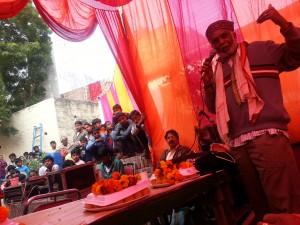 Aligarh, India – Sunil Sardar, the leader of a growing movement called Truthseekers stood in front of a gathering of local farmers and their families. I listened to him share a message in Hindi to several dozen men, women, and children. Though I couldn’t understand what he said, his charisma was captivating. He paused and spoke one phrase in English for the benefit of the few American observers: “Will you follow Bali Raja?”
Aligarh, India – Sunil Sardar, the leader of a growing movement called Truthseekers stood in front of a gathering of local farmers and their families. I listened to him share a message in Hindi to several dozen men, women, and children. Though I couldn’t understand what he said, his charisma was captivating. He paused and spoke one phrase in English for the benefit of the few American observers: “Will you follow Bali Raja?”
Bali what? I’d been to a Billy Graham Crusade before, so I knew what was happening. This was ‘the invitation’ to follow Jesus. But who was this ‘Bali Raja
To say that Bali Raja is a translation for “Jesus” could be true, but it doesn’t tell the full story. I would later come to learn that in Hindu culture, the story of Bali Raja is part of an ancient Indian legend still celebrated today. Bali Raja, which means “sacrificed king,” was a beloved king who gave himself up for the sake of his people. Sound familiar? The Hindu god Vishnu crushed Bali Raja in a deal that would spare the lives of the low caste people of India. As the legend goes, Bali Raja would one day return to his people to rescue them.
In seminary they teach pastors about the importance of contextualization, that is, the art of conveying a timeless message to new people, in new places, in new centuries. You might be unaware of it, but your pastors do this every week as they prepare their message. They read the passage, interpret the passage, and they read you the church, and interpret your cultural context. This practice of being ‘relevant’ should never be a practice in changing or diminishing the gospel. The good news of God is timeless, but cultures do change from generation to generation, from one city to another, and from one people group to another. Because of this, the means by which we communicate the gospel must change with them. This is precisely what the Apostle Paul did in Acts 17 when he stood before the Athenians in the Areopagus. They had no way to understand a Jewish messiah, but they could surely understand their own altar to “AN UNKNOWN GOD,” which Paul wisely used to convey the good news of Jesus. At Truthseekers, they are following in the creative footsteps of Paul.
Rev. Sardar adapted this creative contextualization of the Gospel from the late Mahatma Phule. Phule founded the Truthseekers movement in the 19th century in response to the injustices and systematic oppression of the caste system in India. Today he remains one of the heroes among low castes and Dalits (outcaste, untouchables) in India. Phule was the first to liken the Hindu god Bali Raja with the Jesus Christ. In fact, it was more than simply an association; Phule believed that Jesus is Bali Raja, returned to rescue his people oppressed by caste and all other injustices. Now several decades after the death of Mahatma Phule, Truthseekers has been brought back to life as an evangelical and social justice movement.
There are many that consider this loose missiology to be reckless, and most of us probably feel a certain level of discomfort at the thought of likening Jesus to a Hindu god, or any man-conceived deity. In fact, for many it is doubtful that Mahatma Phule was even a Christian, at least not as we typically would understand one to be ‘Christian’. But the Truthseekers today are not quick to drawl dividing lines of faith. Their concern is the direction of people’s lives, hence the name “Truthseekers”. When Rev. Sardar asks the question, “Will you follow Bali Raja?” his concern is less “are you a Christian” and more “are you rejecting the lie of castes and are you seeking the truth of Bali Raja (Jesus).”
Their methods of contextualizing the gospel may be questioned, but the results cannot. The day after I heard Rev. Sardar ask the question “Will you follow Bali Raja” we visited another village that has seen a radical turn toward Jesus. An entire village seeking Jesus! Most of the villagers lined the streets, worshiping Jesus, thanking God, and hearing the truth: Bali Raja is alive! The scene looked nothing like any church I had ever experienced, but there was no doubt that it was the Church. The Holy Spirit is moving powerfully in India.
Truthseekers International is an organization supported by Covenant World Relief, a ministry of the Evangelical Covenant Church. Stephen Sharkey is pastor of Highrock Covenant Church in Quincy, MA.


